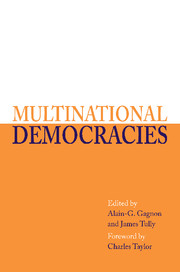Book contents
- Frontmatter
- Contents
- Notes on the contributors
- Foreword by Charles Taylor
- Acknowledgements
- Introduction
- Part I Justice and stability in multinational democracies
- Part II Struggles over recognition and institutions of accommodation
- Part III Modes of reconciliation and conflict management
- References
- Index
Part I - Justice and stability in multinational democracies
Published online by Cambridge University Press: 06 October 2009
- Frontmatter
- Contents
- Notes on the contributors
- Foreword by Charles Taylor
- Acknowledgements
- Introduction
- Part I Justice and stability in multinational democracies
- Part II Struggles over recognition and institutions of accommodation
- Part III Modes of reconciliation and conflict management
- References
- Index
Summary
The first part deals with interrelations between considerations of justice and stability in theory and practice. In the wide-ranging historical and comparative first chapter, ‘So Many Nations, So Few States: Territory and Nationalism in the Global Era’, Michael Keating introduces the major themes. He argues that recognition and accommodation in multinational societies are possible if we set aside the norm of a uniform nation-state. He points out that the nation-state has only existed since the nineteenth century, and as such is only one possible way of dealing with nationality issues. Through a rereading of the histories of multinational societies, Keating demonstrates that there are traditions and practices in multinational societies which can provide a guide to present problems. These traditions and practices however, tend to compete against centralizing and unitarian doctrines. Turning to the multinational states of the United Kingdom, Spain, Belgium and Canada, Keating argues that the states’ ability to accommodate minority national groups has diminished, while the demands of these groups has increased. While some argue that this represents a decline of the state, Keating sides with others who argue that this situation actually represents a need to renegotiate the terms of multinational unions. Such renegotiations could draw upon historic traditions of pragmatism and accommodation as well as a rethinking of sovereignty and the distribution of powers.
- Type
- Chapter
- Information
- Multinational Democracies , pp. 35 - 38Publisher: Cambridge University PressPrint publication year: 2001

